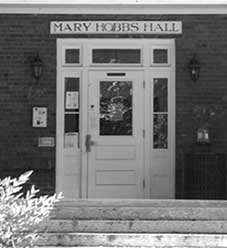If I were a prospective student whoI went to the college web site to look at residence halls, I would probably get really excited about the opportunities posted about Mary Hobbs hall, because I am a female and am interested in cooperative living (sharing cooking and cleaning responsibilities with fellow residents). I would probably even sign up right then and there to live in Mary Hobbs hall, but the facts are that I am not a prospective student, and there is no such thing as cooperative living in Hobbs anymore.
In the spring, administrators in the Office for Campus Life made the decision to end the cooperative living situation in Mary Hobbs hall because the women living there failed to clean the dorm and created an unsanitary living situation. The dorm had a bug infestation and trash in the hallways, and was generally uncared for. The decision came at the same time that the Office for Campus Life streamlined all their room prices, making the cost of a single room the same across campus, and saving the Office for Campus Life the hassle of dealing with a variety of room prices.
It seems to me that this decision carries far greater implications for the college than simply the $60 difference in room prices. This decision has everything to do with tradition and integrity.
The women’s co-op opened in 1907 in New Garden Residence Hall, during a time when it was not considered necessary to give equal advantages to men and women. Mary Mendenhall Hobbs, a staff member at the time, started the “Girls Aid Fund” to raise money to send girls to the college. Every penny was precious, so the girls lived in the least expensive way possible, cooking and cleaning for themselves. Hobbs said, “Girls are of infinite importance.” Her role in the creation of Mary Hobbs hall has opened the world of higher education to many females.
This tradition continued until 1997 when administrators announced that the kitchen of Hobbs would be closed for 1997 – 1998 academic year due to $200,000 in repairs needed to meet Greensboro health codes. The kitchen has never been reopened.
“When they closed the kitchen, to me philosophically that really put an end to the co-op,” Anne Lundquist, the Dean for Campus Life, said. Lundquist said that she and Jodi Gill, the Associate Dean for Campus Life, have been discussing ways to reopen the co-op. She wants to speak with former Mary Hobbs hall residents and Sodexho, the college’s food service provider, to see what the possibilities are.
My fear is that just like in 1997, the college will find other avenues to spend their money, and this rich tradition will be lost forever.
The other issue raised is what role students should play. Elizabeth Pastorfield-Li, a Mary Hobbs hall resident said, “I definitely think [the end of the cooperative living] is a shame, but I feel it was deserved.” Pastorfield-Li said the residence hall was a mess, and no one did their chores, adding, “Hopefully we can work to change it and bring it back but not ’til there are committed people.”
I lived in Mary Hobbs hall my sophomore year, and I, unlike Lundquist, considered it a cooperative living situation. When I signed up to live there I knew I had responsibilities to the group. During that year I realized that cooperative living means more than just cleaning together. I found a community of strong females. I found a resource in other women.
I think the college needs to stop pretending. There is a huge discrepancy in a college that boasts an environment which supports equal education for women, yet cuts a program like the co-op. The college has turned its back on years of a proud feminist tradition, which began with Mary Mendenhall Hobbs. Until the Office for Campus Life makes active change and restores the co-op, I think we should take the claim off of the college Web site. That tradition is dead.
Josie Black is a senior Education Studies and English major.
Categories:
Cooperative living ends in Mary Hobbs
Josie Black
•
September 25, 2003

Mary Hobbs may never be the same (Megan Miller/Guilfordian)
0
More to Discover
